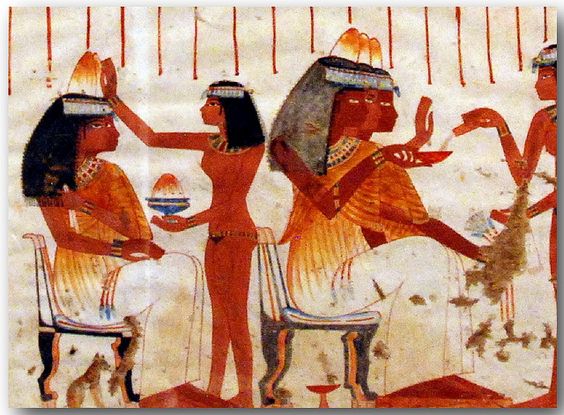The Egyptians, along with the other ancient civilizations, were complex societies. Their culture has many similarities with modern societies, one of which was their concern for beauty. Egyptians went to great lengths to ensure that they were portrayed as flatteringly as possible, rarely depicting their true age. Youth was seen as central to their concept of beauty.

When one looks at human depictions in the artwork of the ancient Egyptians, one may notice the black lines around their eyes. Upon closer attention to detail, one notices that it resembles the way girls today apply eyeliner. This is what was intriguing enough to spark questions about the Egyptian society’s views on cosmetics. Was it a statement of beauty? Of power? Did it relate to their status?
There is evidence to support the generalization that Egyptians may in fact have valued beauty even more than we do today. They expressed their fondness for beauty in their artwork. Their sculptures and paintings provide evidence for how they valued beauty. The value they saw in beauty is depicted in their paintings and sculptures, such as the bust of Nefertiti, which was made to make her look flawless. They also used eye paints (similar to today’s eyeliner), and it was typically made from malachite and galena. Eventually galena became the country’s primary eye paint, and both are found in tombs on pallets and stones that are believed to have been used in preparation of the paints.1
The image to the left is a statue from the Egyptian Museum of Cairo. This statue gives us a visual representation of the ideal form of a male. One may notice the square, wide shoulders, a slim, muscular figure, and a very defined face shape.

The image to the left is a bust of Nefertiti, the great Royal Wife of the Pharaoh Akhenaten. It is believed to be sculpted by Thutmose, who is believed to be the official court sculptor of Pharaoh Akhenaten.2 It was recovered in his workshop and is believed to have been sculpted in 1345 BCE. Nefertiti was a staple for beauty in her time, and her husband strove to make her co-equal with himself, making her one of the most powerful women ever to rule. Nefertiti was universally portrayed as beautiful, and her beauty can still be appreciated today. As one can see in this bust, the queen was sculpted to depict an exemplar of beauty, with a slim face, painted lips, long neck, and adornments on her head and clothes.3
It seems that maybe the Egyptians were more beauty crazed than people of our generation. It is apparent that the ancient Egyptians did not find pride or beauty in older ages. They preferred to alter the way they looked, instead of having themselves accurately represented. It gives us the impression that maybe this ancient culture is not as different from ours as we may have initially assumed.
- A. Lucas, “Cosmetics, Perfumes and Incense in Ancient Egypt,” The Journal of Egyptian Archaeology 16, no. 1/2 (1930): 41. ↵
- Who’s Who in Ancient Egypt, Routledge, 2003. s.v. “Thutmose (c. 1352 – 1366 BC), ” by Michael Rice. ↵
- Thutmose. Bust of Queen Nefertiti, Egyptian Museum Berlin, n.d. http://www.egyptian-museum-berlin.com/c53.php. ↵



65 comments
Gabriela Medrano
Interesting topic for your article! I had not made the connection between the make up Egyptian women wore and the artwork of their time. It is so true that we commonly see their eyes bolded with eyeliner and darker shades of color. Plus their hair and accessories never failed to reflect in the art sculptures and drawings. I sort of agree with your point of youth was key but I feel that idea has been reversed present day. Nice way to correlate the significance of beauty in todays world with the way society depict in the past.
Alexis Soto
I always found beauty to be interesting as beauty is subjective. Yet many different cultures possessed fondness for beauty and perfection in their own way. One thing I had not known before reading this article was that even the ancients sought to enhance beauty in a way men and women do with make-up and other beauty and cosmetic products. It may seem we are more in common with people of the past then we may think.
Briana Bustamante
I found this article very interesting with the comparison of who is more concerned about beauty, the Women in ancient Egypt or Women in today’s society? I feel that women in today’s society are more concerned about how they look on the outside, rather than how they act or are as a person. In today’s society it is so easy to get work done to make you look skinnier, or your lips to be fuller, or your bone structure to be more defined. Although, reading your article informed me that the concern about beauty was a conflict many centuries ago just as much as it is today. I guess somethings just never change and girls will always be concerned with their appearance.
Tina Valdez
Your topic was very interesting and so were your findings! I cannot imagine a culture that values beauty more than we do today, but your article convinced me that the Egyptians my have done so. I always imagined that with time our culture will only value beauty more, would that make us more like the Egyptians? There are certainly similarities – our culture encourages the alteration of our appearance – it is evident that Egyptian culture did the same. It is interesting to think that we were not the first.
Joshua Tinajero
It’s amazing how much Egyptians valued beauty, and how frequently make up was use to express their appreciation of self-beauty. In our society, it is only common for women to wear make up, which is definitely a major change as compared to the Egyptian age. Great Article!
Jacob Hall
You know those times when you tell your parents something and you like now a days, and then they look at you and say that has been happening since I was your age. I feel like that applies to this, I mean I know that we have always sought beauty and perfection but i did not realize its been going on for this long. Maybe some day things will change, or maybe just our idea of beauty will altar a little. Anyhow this was a very informative article and I really enjoyed it.
Erik Rodriguez
I found this article very fascinating. I didn’t know at that time there was “eyeliner” or any cosmetics available to women. Personally, I find it odd how beauty has always been a sign of power. I believe in natural and inner beauty, so it makes me sad that for all this time women have felt the need to alter the way they look. I hope society learns to accept natural beauty in all people.
Overall, this article opened my eyes to a women’s life.
Very intriguing and revealing!
Keep up the good work!
Andres Palacios
Great article, I really never saw this perspective of what beauty represented for those generations but after reading the article I learned that it is so similar to today’s society in many aspects. We’ve definitely been having trouble since long ago accepting ourselves and how we really are physically, obviously we all want to look good but there are different stages of life and we just have to learn to accept them. Very interesting and well written article.
Jezel Luna
I found this article making me questioning whether today’s or Egyptian women value cosmetics more? I believe that back then it showed more power rather than just looking good. It’s funny how ideas from modern and ancient history contradict and reflect each other. I really enjoyed how you related it to today’s society. Great job!
Aylin Salinas
I was aware that external beauty had been a problem for quite a while now, but I did not know that it had been around since that time period! It’s crazy to think that we haven’t come very far from that point. We still uphold this perfect image of women and expect all of women to live up to that image.